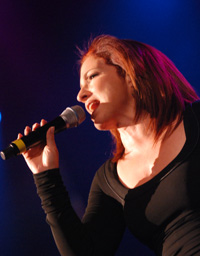Commencement Concert 2007
A Touching Tribute: Berklee's Honorary Doctorate Recipients Impressed with Students' Performances
Gloria Estefan performs "Coming Out of the Dark" at the commencement concert. Photo by Phil Farnsworth
Following an arrangement of her dance hit "Conga," Estefan joined Berklee musicians on stage at the Agganis Arena for an impromptu, unrehearsed performance of her song "Coming Out of the Dark" during the annual commencement concert.
The crowd erupted in applause and cheers as Estefan made her way to the stage. Before singing, Estefan acknowledged her husband, music producer Emilio Estefan, who wrote the song with her and Jon Secada.
"If anyone ever helped me come out of the dark, it was him," Estefan said. The song, from her 1991 Into the Light album, was released a year after a bus crash that nearly killed her.
The next day, during a press conference, Estefan said she hadn't expected to get up on stage. "It was a surprise for me," she said. "It was beautiful to be able to sit in with [the students], and feel their energy up there."
Every year, concertgoers and student performers wait in suspense to find out whether the honorees will join students on stage in the tradition of recipients such as Natalie Cole, Phil Collins, Chick Corea, Duke Ellington, Dianne Reeves, and Steven Tyler.
Berklee's honorary doctorate recipients at a press conference. From left to right: Joanne Robinson Hill, on behalf of her late husband Andrew Hill; Emilio Estefan; Gloria Estefan; and the Edge. Photo by Phil Farnsworth
In keeping with the tradition of the commencement concert, students paid tribute to this year's honorary degree recipients—the Estefans, the Edge, and the late jazz pianist and composer Andrew Hill—with faculty and student arrangements of their work.
"I look forward to this concert each year because it provides us an opportunity to celebrate," Lawrence Simpson, senior vice president for academic affairs, said. "First, we're celebrating the success of our graduating students. And we're also celebrating the wonderful music of our honorary degree recipients."
Performances of Estefan's songs included dance hits "Rhythm Is Gonna Get You" and "Get on Your Feet," Latin medley "Mi Tierra/Oye Mi Canto," and ballads "Don't Wanna Lose You" and "Here We Are."
Performances of songs produced by Emilio Estefan included "Let's Get Loud" (Jennifer Lopez), "Do You Believe in Us" (Jon Secada), and "Ojos Asi" (Shakira).
Students perform U2's "Pride (In the Name of Love)." Photo by Phil Farnsworth
In tribute to Hill, performances included "Black Fire," featuring Berklee alumnus Greg Osby on alto saxophone, and "Passing Ships," arranged by Contemporary Writing and Production Department professor Richard Evans, a former classmate of Hill's.
Students arranged three of the evening's performances: "Rhythm is Gonna Get You" arranged by Haim Mazar, "Electrical Storm" arranged by Anthony Baldino and Tara Sarmov, and "Don't Wanna Lose You" arranged by Asaf Sagiv.
Berklee commencement concerts feature arrangements that are unique versions of the honorees' work, while staying close to the artists' original concepts, the concert's executive producer, Rob Rose, noted. "We try not to do anything like the records. We try to do new versions so that the students are featured as who they are, and have a chance to showcase [their talent]."
The performances certainly made an impression on the honorees, who were touched and overwhelmed by the concert, they said at the press conference.
"The students that I've met have all been incredibly alive," the Edge said. "We watched them perform last night and they're an incredibly talented, gifted bunch."
Nadine Ford performs Gloria Estefan's "Here We Are." Photo by Phil Farnsworth
For the honorees, the performances even led them to see their work in a different light.
"It made me want to change the middle eight of 'Where the Streets Have No Name,'" the Edge said.
Estefan pointed out that after creating music in the studio, performing it is "like delivering your babies. There's such a thrill about that. It's nice that my babies are growing and standing the test of time," she said, referring to the students' performances. "For example, one girl [Nadine Ford] did 'Here We Are' and did this rendition that never in my wildest dreams when I wrote this would I have imagined it done that way. She just blew me away with it. It was a beautiful thing to see."
Andrew Hill would have been "so pleased" to hear his compositions performed as they were at the concert, noted his wife Joanne Robinson Hill, who accepted the honorary doctorate on her husband's behalf. "I was absolutely delighted. I think the students did an extraordinary job. One of the things I hope we can look forward to is continuing to hear his music performed in new ways. Andrew was never intent on keeping things locked into a strict formula. He was always rewriting, reorchestrating things."
Indeed, it was the unique interpretations of their work—arranged by faculty and students and performed by students and an alumnus—rather than a strict reading, that impressed the honorees.



